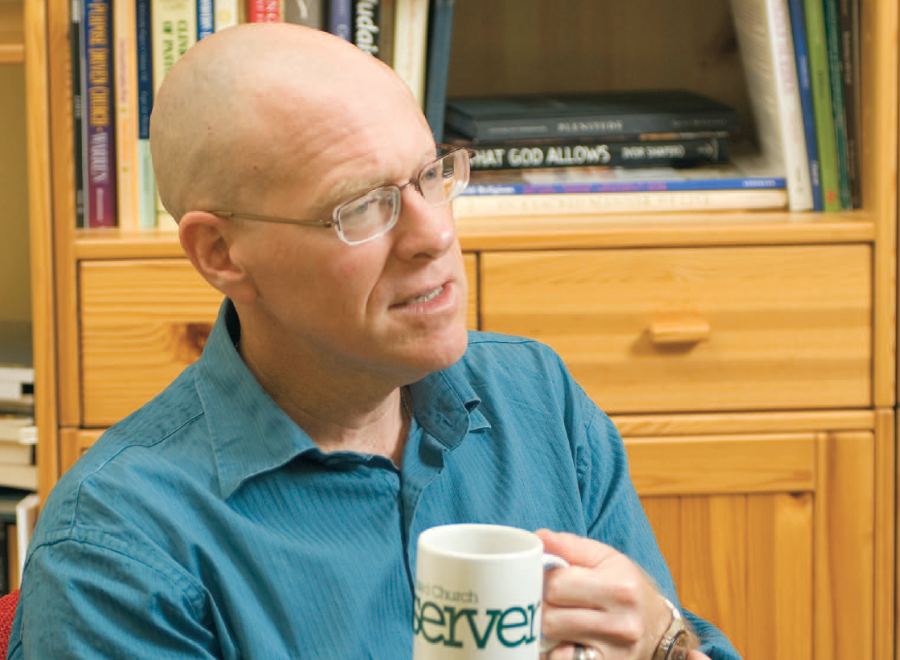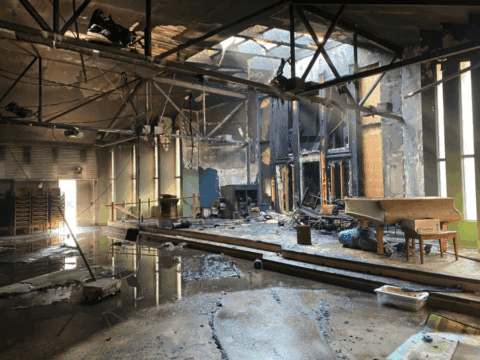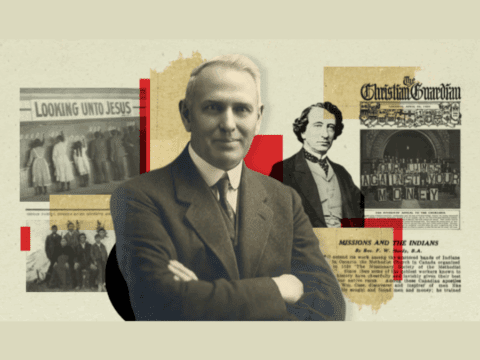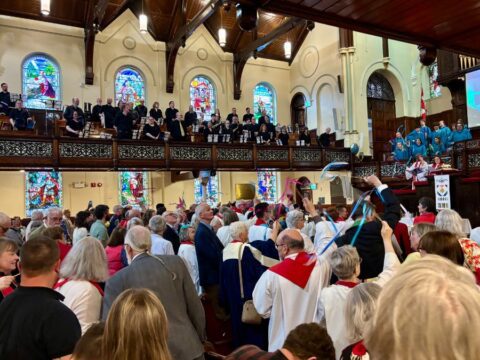Two-thirds of the way through his term, Moderator Rt. Rev. David Giuliano sat down with David Wilson to talk about leadership, trust and how his personal journey of healing has informed his understanding of the church he leads.
DAVID WILSON: You began your term with the words “be not afraid.” What’s your view of the fear factor in the United Church 22 months later?
DAVID GIULIANO: I think fear’s part of who we are, although my sense is that there is such a range of it. Some congregations I’ve encountered are still living in almost complete survival desperation. Others have crossed over from that desperation to freedom, saying, “We can do whatever we want.”
I’m realizing that the real challenge around fear is that we’ve tried to deal with it by figuring out ways of being “successful.” But sooner or later, we are coming to the point where we realize the true answer to fear is faith. We need to learn our stories and our language and live more radically the culture of the Gospel. In the end, that will take us to riskier places.
DW: Is there a willingness in the church right now to take risks?
DG: Again, there’s a whole range. There are those who see a big risk in having coffee available on the way into worship. Then there are those who say, like one church in Ottawa said, “You know, our building is interfering with our mission,” and sold it and had a new kind of freedom to be the church. Those who are taking risks are discovering a new vitality of Spirit.
DW: Are there ways in which your view of the United Church has changed during your time as its elected leader?
DG: This may surprise you, given the challenges that we face, but I’m probably more hopeful than I was. I’ve experienced a range of incredibly faithful, visionary people who are living the Gospel in concrete ways that are very encouraging. I feel we are recognizing that The United Church of Canada has a special place in the Body of Christ because of our theology and our approach to ministry, but that we need to ground it more visibly in the Gospel.
I say visibly because many of us have difficulty talking about the Good News. I don’t think we’ve taught people how to talk about it, we haven’t provided the vocabulary. How many of our laypeople and even clergy are comfortable with engaging the wider world in a conversation about Jesus Christ that doesn’t feel like we’re going to hit people on the head with a Bible? How many of us practise the culture of healing and radical hospitality, of servanthood in community, with no strings attached?
DW: Your illness has been a big part of your term so far. You seem to view it as something the church can learn from. That must have been an aspect of your term you didn’t anticipate.
DG: In some ways, I have felt that I have been experiencing in my body some of the same things we are experiencing as a church. I don’t want to be guilty of narcissism, but on the other hand I have felt like if I am to offer myself, this is what I’ve had to offer. For better or for worse, the gift is vulnerability, brokenness.
DW: Are you saying cancer has been a kind of gift?
DG: Right after my election at the 2006 General Council, my beloved Pearl and I took a walk outside. The northern lights were dancing. We found out later our daughter was watching them at the same time 500 miles away on Lake Superior. We felt this beautiful moment — at the same time I felt a new lump on my temple. Is one part God and another part not God? I don’t believe that God gave me cancer, but maybe my soul knew I needed to be humble in this experience in some way, that to truly speak to our community I had to do it from a place of weakness, not strength.
DW: Let’s switch gears. A consultant’s report last spring cited a disconnect between church leadership and the people in the pews. Do you agree?
DG: It’s important for those of us who work nationally or regionally to learn what true servant leadership is. On the other hand, congregations need leadership that stretches us all beyond our sometimes-limited vision for what it means to be the church.
Here’s something that blew me away. I was meeting with some young people, and we were dramatizing the story of Samuel and Eli. I was old Eli. I asked, “What would you want to tell the worshipping community?” A young woman said: “We love The United Church of Canada, we love the progressive theology, the passion for social justice, the inclusiveness of all people. We just can’t find it.” Ouch. In that moment, I knew how Eli felt. Congregations need to hear that challenge, too.
DW: The report in question also cited distrust.
DG: That distrust is the most painful thing for me. When we made decisions last year that resulted in the loss of positions at the national church, I knew people would be upset. I was upset. But what astounded me were the conspiracy theories, the idea that somebody had a secret agenda.
DW: Why do you think that level of distrust exists?
DG: Part of it is history, and I was a little naive about that. But I also think that when we’re afraid, when we are threatened, we look for people to blame. To be clear: it was prayerful, elected members from across the country who made those decisions.
DW: Let’s talk about the next General Council, which you will chair. There’s a disconnect. There’s a church that’s ailing in some ways and strong in others…
DG: We are a very strong church, but we are too easily seduced by the values of Empire, which are measured by money and numbers. We don’t have a big disciple-factory out by the highway, so we must be failing God. I don’t remember that having anything to do with Jesus’ agenda. I’ve been wondering what God is saying to us in our emerging experience of loss. How might that be an opportunity to draw nearer the Christ?
DW: So how important will the next General Council be?
DG: We all hope that every General Council will be a transformative moment in our shared journey. The theme will be “Down to the Potter’s House” — presenting ourselves to be reshaped by God. That’s the ongoing nature of the life of faith. But God’s Spirit is totally unpredictable. It doesn’t always work to our timeline and structure.
DW: What has given you the most satisfaction in the past 22 months?
DG: I would say that one of the most beautiful things has been the visits to bring apologies into our First Nations communities and being part of the Church Leaders’ Tour on residential schools. The satisfaction is about how The United Church of Canada has national leadership in this long, hard walk toward right relations.
DW: Two-thirds of the way through, do you have any regrets?
DG: Only that I haven’t been able to enjoy it more. I feel that I’ve been able to offer what I need to offer to the church, but I regret that I haven’t had the energy to take the pleasure out of it that I’d like to. I’m hopeful that maybe I’ll get to do that next year as I feel healthier. The greatest blessing is to feel that you are serving God as you are called. I wish I had been able to smile more about it.
***
This story first appeared in The United Church Observer’s September 2008 issue with the title “‘We are too easily seduced by the values of Empire.’”














